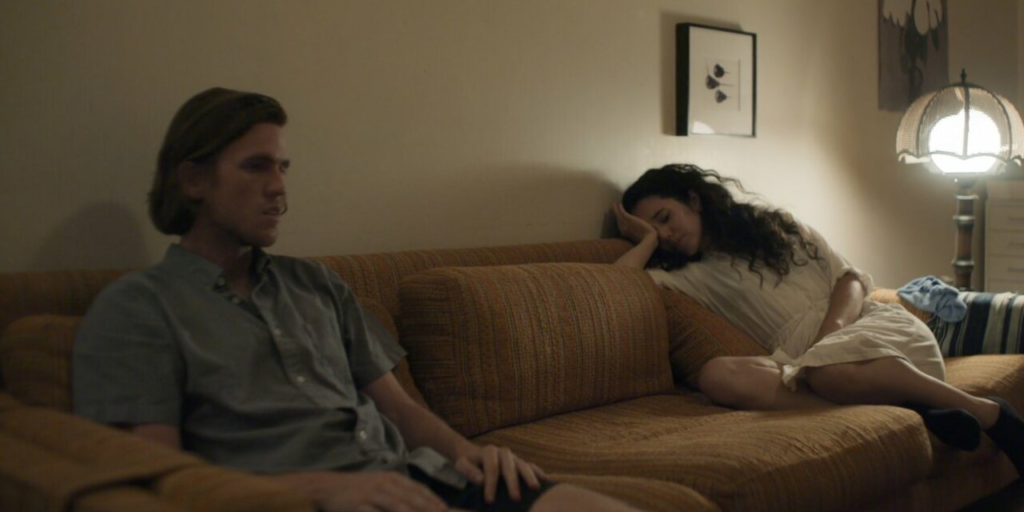Director: Kit Zauhar
Writer: Kit Zauhar
Stars: Kit Zauhar, Zane Pais, Ian Edlund, Jessie Pinnick
Synopsis: Tensions rise when a couple stays at the home of a reclusive host, with the three entering an intimate battle to gain and reclaim territory.
Despite its basic premise – girl falls for boy and hurts those closest to her in the process – Kit Zauhar’s first feature, Actual People, is a tough sit. Not because it’s by any means a bad film, but because it’s a shockingly recognizable story. It follows Riley (played by Zauhar), a recent NYU graduate who desperately pines for the attention and affections of a boy from Philadelphia, her hometown, and proceeds to take advantage of all in her orbit in order to win him over. Of course, she learns a great deal about herself as she attempts to find her place in the world, but it’s not the sort of film that concludes with a metaphor-laden monologue about independence nor identity. Instead, it’s a film that places a mirror in front of its viewer and asks, “Do you think you’re a good person?”

Zauhar might believe that such people exist, but she’s certainly not interested in featuring them in her films. “I just don’t think nice people are interesting on camera,” she told Filmmaker Magazine in 2022. “I think art is meant to reflect the worst parts of yourself back to you. Unlikable characters can make you a better, and I think more empathetic, person in real life. The function of a lot of really great art is to make you confront brutality and cruelty, so that you can walk out into the world and be a little bit more conscious of horrible things that are happening, maybe even inside of you.”
It’s an interesting idea, one that Zauhar has made good on twice now, both in her 2021 debut and in her sophomore effort, This Closeness. A work of psychoanalysis disguised as a one-location dramedy, it’s the sort of work that makes you feel more like a fly on the wall than a distant viewer; yet even as a fly, you are aware enough to feel the discomfort that comes with being somewhere you weren’t invited to. That’s not exactly the case for Tessa (Zauhar), an ASMR YouTuber, and her boyfriend, Ben (Zane Pais), who take a weekend trip to Pennsylvania for Ben’s high school reunion, only to find that their Airbnb host is still in the apartment when they arrive. (And he doesn’t intend to leave.) Adam (Ian Edlund) isn’t exactly a Grade-A welcome wagon, at first only exiting his room long enough to force awkward conversations upon his guests, or to reiterate the fact that it was his former roommate who posted the listing, not him. “You know when being socially awkward becomes a physical feature? That’s what happened to this guy,” Ben jokes.
That descriptor may be true, but Adam also fits the socially awkward bill characteristically, making each ensuing interaction between This Closeness’ de facto trio more cringeworthy than the last. Early on in their stay, Tessa wishes to put some beer in the fridge, prompting Adam to show her that he has split each shelf directly down the middle with a piece of painter’s tape and two index cards – “Guest” on the left, “Host” on the right – dictating who can put what food where. His side is packed solid, while Tessa’s freshly-opened six pack is the sole occupant on her shelf. “Now it kinda just looks like I’m an alcoholic,” she says with a chuckle. “My parents are alcoholics,” Adam responds, deadpan. “Their fridge doesn’t look like that.”

Over the course of the film’s brisk, yet unsettling, 88 minutes, Adam grows to be less reclusive, and Tessa responds in kind, while Ben starts to show signs of toxicity from the moment he first leaves the apartment for a pre-reunion dinner, returning later with a flirty high school pal named Lizzie (Jessie Pinnick). Their interaction is the sort you’ve seen before, if not been a part of: A bond between two old friends that has an undeniable air of sexual tension, a considerable amount of teasing banter, and far too much touching for two people who claim to have never slept together. The morning after their late-night catch-up session, Tessa expresses her discomfort, to which Ben responds by telling her she’s wrong, with his primary grievance being that she’s not being nice to him – real words said by a real person in this film. The grand finale of this argument sees Ben slamming Tessa’s iced coffee on the ground; later, he “apologizes”, but qualifies his laments with, “Please be nice to me again.”
As much as This Closeness is a portrait of power in a shared environment, it’s also an incredibly sharp dissection of a toxic relationship, one in which the male assumes perpetual dominance over the female, who succumbs to his whiny requests no matter how irredeemable his actions are. It’s in these settings that Zauhar’s script is at its strongest, especially in a scene where Tessa calls her therapist in tears to discuss her relationship and describes her love for Ben as something that “feels really lonely.”
She continues: “As much as I complain about him, or I know things aren’t working, or they could be and I just don’t know how to get us there – maybe that’s the same thing – I feel so much for him, and see so much in him that no one else does. I mean, you can’t explain what compels you to someone else, you just feel it in your whole body. And that’s why I think it’s so lonely, because you can love someone so much and not be able to share that with anyone.” In layman’s terms, Tessa is someone who is trying to justify the existence of a dying relationship, if it’s not already dead. When she notes that she wants to belong to Ben, her therapist asks, “Why?”, to which Tessa responds, “Because it means I won.”
Of course, “winning” is not a reason to stay with someone, an internal conflict that This Closeness puts to the test as it rolls toward its pitch-perfect final shot. The more in touch with these emotions Tessa gets, the more argumentative Ben grows, and the more approachable Adam becomes. It’s worth questioning, though: Are we seeing these men through Tessa’s point of view, even with her in the frame? Is Ben truly this over-critical, unnecessarily-cruel menace? Is the more congenial Adam an ideal version of him in Tessa’s eyes, this stranger representing a reprieve from the torturous partnership she’s locked herself in for years despite her silent urge to escape?
Then again, perhaps these characters are exactly as they seem, fitting the same mold as all of Zauhar’s inventions. After all, she doesn’t think “nice people are interesting on camera”; had the four characters in This Closeness been “better” people, they wouldn’t have conjured such questions nor made for any sort of stimulating conversation. They would have been avatars operating in a setting with a conscious awareness of others, having inauthentic conversations about their peers, and enduring no conflict. Instead of beginning to form her own thematically-rich unofficial trilogy, a la Paul Schrader’s “Man in a Room” films (First Reformed, The Card Counter, and Master Gardener), Zauhar would have a series of stories that fall under the “People in a Room Doing Nothing Much at All” umbrella.

In a way, that distinction is fitting for the stories she wishes to tell, but she’s sure to litter her films with complications, ones that make these rooms battlegrounds and these people terrified soldiers. It’s an aesthetic that might grow tiring at 120 minutes, but at 88, it sings as a slice-of-life drama that will feel almost too familiar to every viewer, in some way or another. In all likelihood, they’ll walk away panicked, thinking, “I’m not like them… Right?”. I imagine that’s precisely the response Zauhar wants. As long as you keep returning to the mirror, looking a little bit deeper with every gaze until the truth finally comes out.





